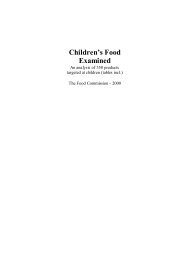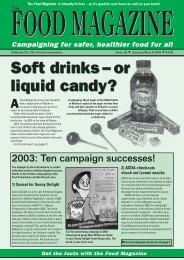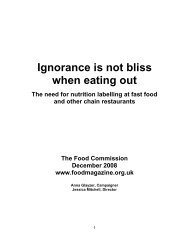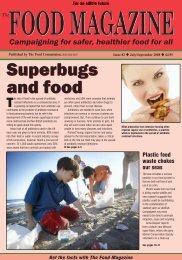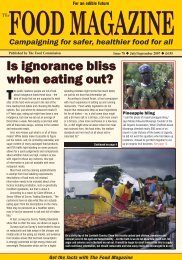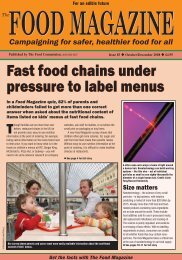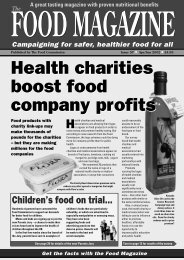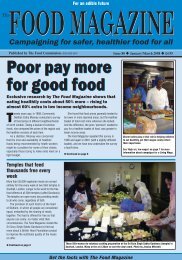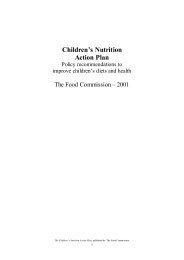Campaigning for safer, healthier food for all - The Food Commission
Campaigning for safer, healthier food for all - The Food Commission
Campaigning for safer, healthier food for all - The Food Commission
You also want an ePaper? Increase the reach of your titles
YUMPU automatically turns print PDFs into web optimized ePapers that Google loves.
egulation<br />
Advertising regulator cave<br />
It has taken<br />
over two<br />
years <strong>for</strong><br />
Ofcom to<br />
suggest how<br />
it might<br />
regulate<br />
junk <strong>food</strong><br />
ads aimed at children. Quite<br />
frankly, it wasn’t worth the<br />
wait, says Richard Watts of the<br />
Children’s <strong>Food</strong> Bill campaign.<br />
Back in 2003 concerns were mounting<br />
over <strong>food</strong> quality and childhood obesity,<br />
and an extensive House of Commons<br />
select committee enquiry on obesity concluded<br />
that junk <strong>food</strong> marketing should be controlled to<br />
prevent chronic diet-related diseases. <strong>The</strong> <strong>Food</strong><br />
<strong>Commission</strong>’s Parents Jury had made its mark,<br />
spotlighting unhealthy children’s <strong>food</strong> products<br />
and marketing practices. <strong>The</strong> Government bowed<br />
to public pressure and asked the communication<br />
regulator Ofcom to look at options to restrict junk<br />
<strong>food</strong> advertising aimed at children.<br />
A mere two and a half years later, and<br />
Ofcom has fin<strong>all</strong>y published its consultation<br />
document. It wasn't worth the wait.<br />
Ofcom has suggested four options to protect<br />
children from junk <strong>food</strong> TV adverts but have<br />
completely ruled out the one option that <strong>all</strong><br />
health, consumer and <strong>food</strong> groups have c<strong>all</strong>ed<br />
<strong>for</strong> in one of the most coordinated and farreaching<br />
public campaign coalitions in decades.<br />
What over 100 national health organisations<br />
agreed upon was that the regulator should<br />
protect children from junk <strong>food</strong> ads right up to<br />
Badvertisement<br />
Cupcakes? How refreshing!<br />
At the <strong>Food</strong> <strong>Commission</strong> we have often<br />
pointed out that descriptions that imply<br />
‘fresh’ or ‘fruity’ qualities should be treated<br />
with suspicion. Indeed, we have found in<br />
recent surveys that the word ‘refreshing’<br />
applied to juice drinks should usu<strong>all</strong>y be<br />
taken to mean ‘with lots of added water’.<br />
People need to learn a new language to<br />
understand <strong>food</strong> labels. In the case of these<br />
Refreshers cupcakes, ‘refreshment’ associated<br />
with sherbert sweets and a fizzing sensation.<br />
But the fruitiness? <strong>The</strong> different flavours of<br />
these gaudily coloured pink and yellow buns are<br />
the 9pm watershed. This option would, the<br />
coalition argue, significantly reduce children's<br />
exposure to junk <strong>food</strong> adverts and <strong>all</strong>ow<br />
concerned parents to exercise responsibility over<br />
whether their children see such ads at <strong>all</strong>. Yet the<br />
option has not even been put <strong>for</strong>ward by Ofcom<br />
<strong>for</strong> public consideration. This is choice editing at<br />
its most extreme. Instead, Ofcom’s options are:<br />
(1) Junk <strong>food</strong> ads be limited during children’s<br />
television and a few other times. For some<br />
reason, Ofcom has defined ‘children’ <strong>for</strong> this<br />
purpose as aged four to nine. See the box on the<br />
right <strong>for</strong> how the <strong>Food</strong> Magazine reacts to this<br />
proposal. Given that the commercial TV<br />
programmes most watched by children (aged up<br />
to 16) are in the key early evening slot (such as<br />
Coronation Street and <strong>The</strong> Bill) this is likely<br />
simply to cause a shift in the way junk <strong>food</strong>s are<br />
advertised, with advertisements moving from<br />
5pm to 7.30pm.<br />
(2) Ofcom's second option rather bizarrely<br />
proposes the same regulation on the timing of<br />
adverts as above but <strong>for</strong> healthy <strong>food</strong> as well as<br />
junk <strong>food</strong>. When pushed, Ofcom has admitted<br />
that they included this option under pressure<br />
from the junk <strong>food</strong> industry who still refuse to<br />
admit there is such a thing as a 'good' or 'bad'<br />
<strong>food</strong>. One out, <strong>all</strong> out, the junk <strong>food</strong><br />
manufacturers want us to say. Yet health<br />
organisations have always argued <strong>for</strong> healthy<br />
<strong>food</strong>s to be given the clear benefit of being able<br />
to be marketed to children, to help redress<br />
dietary balance. A balanced option is not on offer<br />
from Ofcom here.<br />
(3) <strong>The</strong> third option also includes ‘good’ <strong>food</strong><br />
advertising and suggests that <strong>food</strong> can only be<br />
advertised <strong>for</strong> set amounts of time every hour<br />
(e.g. <strong>for</strong> two minutes every hour). This option still<br />
<strong>all</strong>ows junk <strong>food</strong> to be advertised during children's<br />
TV and will inevitably favour the largest <strong>food</strong> and<br />
Lipsmacking Lemon and Rip-<br />
Roaring Raspberry. Inevitably, the ingredients<br />
list shows not a hint of fruitiness. Hydrogenated<br />
vegetable oil and several types of sugar do,<br />
however, put in star appearances.<br />
drink manufacturers who will be able to outbid<br />
sm<strong>all</strong>er manufacturers <strong>for</strong> the limited advertising<br />
time available. As readers of the <strong>Food</strong> Magazine<br />
will know from long experience, the larger<br />
manufacturers do not necessarily produce the<br />
healthiest <strong>food</strong> and drink products <strong>for</strong> children!<br />
(4) Ofcom's fourth option is, amazingly, an<br />
open invitation to industry to come up with their<br />
own package of measures.<br />
Despite admitting that the health benefits<br />
flowing from a pre-watershed ban would save<br />
the nation up to four times the amount of money<br />
it would lose TV companies, Ofcom described<br />
this option as ‘disproportionate’. Translating<br />
government-speak, this means that they think<br />
industry will lose out if stricter measures are<br />
implemented. In this case, introducing the notion<br />
of 'proportionality' means a trade-off between<br />
children's health and TV company profit.<br />
Ofcom has also ruled out pre-watershed<br />
controls because it claims parents are against it.<br />
However even its own poll shows twice as many<br />
parents support this idea as oppose it.<br />
Neither of Ofcom's reasons to rule out the<br />
pre-watershed ban hold water and yet the<br />
regulator has ruled out the only effective way of<br />
protecting children from junk <strong>food</strong> adverts. But<br />
maybe Ofcom aren't re<strong>all</strong>y an independent<br />
regulator at <strong>all</strong>. We placed a Freedom of<br />
In<strong>for</strong>mation request, which showed that Ofcom<br />
consulted industry groups 29 times when it<br />
drew-up its proposals, compared to just four<br />
meetings with health and consumer groups.<br />
Until now, Ofcom's way of doing business<br />
has been to do cosy deals with broadcasters<br />
behind closed doors. This style of regulation<br />
means they are umbilic<strong>all</strong>y linked with industry.<br />
Health, <strong>food</strong> and consumer campaigners had to<br />
fight even to meet Ofcom in the first place and it<br />
is clear their views have been ignored as Ofcom<br />
<strong>for</strong>mulated its proposals. For Ofcom,<br />
consultation is a sham.<br />
Despite Ofcom's weak recommendations<br />
Sustain’s Chidren’s <strong>Food</strong> Bill will continue to<br />
campaign to ensure children are protected from<br />
junk <strong>food</strong> advertising.<br />
With the recent announcement that one in<br />
three UK children is now obese or overweight<br />
there is still a very great deal at stake.<br />
Richard Watts is the new campaign<br />
coordinator <strong>for</strong> the Children's <strong>Food</strong> Bill.<br />
Contact: Sustain, 94 White Lion Street,<br />
London N1 9PF; www.childrens<strong>food</strong>bill.org.uk<br />
Charlie Powell, <strong>for</strong>mer Children’s <strong>Food</strong><br />
Bill campaign coordinator, has moved on to<br />
become a trade campaigner <strong>for</strong> Oxfam, and<br />
we wish him well in his new work.<br />
<strong>Food</strong> Magazine 73 12<br />
Apr/Jun 2006



